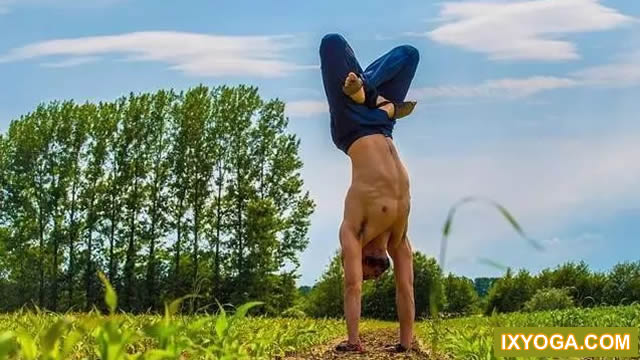Before reading this article, please click the blue font above, and then click “follow”, so you can continue to receive all kinds of entertainment articles for free.
Share every day, completely free subscription, please rest assured to pay attention.
Some Gaja people react to the phenomenon of sudden tinnitus during yoga practice.
That kind of feeling makes us very trance.
The sound is high and low, and the tone is irregular.
It’s like flying insects buzzing in our ears, but in fact, it’s very quiet around.
Tinnitus is that there is no corresponding sound source or electrical stimulation in the outside world, but there is sound feeling in the subjective ear or intracranial.
Most of the time, sudden tinnitus can be relieved by itself, but some people are worried about it and don’t know why it happened.
So today, let’s talk about why tinnitus occurs during yoga practice and how to deal with it.
Causes of tinnitus 1.
Hold your breath during practice.
During yoga practice, especially in the posture of maintaining strength, many Jia people will forget to breathe smoothly and hold your breath to complete the posture.
However, holding your breath is easy to cause respiratory stagnation, reduce the input of oxygen, and lead to insufficient blood supply to the body.
At this time, it is easy to produce dizziness and tinnitus.
2.
When we are doing standing forward flexion or inverted three-dimensional posture with the head lower than the pelvis, such as head handstand and double angle posture, the blood will impact the head, which forms the blood pressure difference between the heart and the chest, neck and head.
If you suddenly get up, the blood flow back to the head will be very rapid, resulting in dizziness and tinnitus.
3.
High intensity practice many Jia people still insist on practicing or choose high-level courses that are inconsistent with their own level when they are tired.
According to experts, people doing high-intensity exercise in a tired state will loosen the structure called otolith in the inner ear, affect hearing and cause tinnitus.
The shift of otolith position causes tinnitus.
With this high-intensity practice, you will have shortness of breath and accelerated heartbeat, which will increase the capillary pressure of organs near the ear and produce pulse tinnitus.
Therefore, it is important not to force yourself, but to practice moderately.
4.
On weekdays, “bow head” or “mobile phone control” are also groups that are easy to find tinnitus.
Due to the bad posture, excessive pressure, tension and fatigue of long-term use of mobile phones and computers, it is easy to lead to insufficient blood supply to the head, disturbance of blood circulation and cochlear microcirculation in the inner ear, ischemia and hypoxia of auditory cells, and then lead to tinnitus.
In order to reduce interference, many people like to wear headphones to listen to music and make phone calls, which will oppress our eardrums and damage the function in the ear.
In addition, certain radiation caused by electronic products to the human body will also cause auditory dysfunction, resulting in tinnitus.
Of course, some practitioners have tinnitus, such as vertigo, hypertension, auditory system diseases, or ear pressure problems, which will be more prone to tinnitus during exercise.
How to deal with it? 1.
Swallowing saliva and food can help balance the pressure in the ear.
Therefore, tinnitus occurs when practicing yoga.
When the ear is buzzing, you can swallow saliva or drink a mouthful of water, which can help alleviate the symptoms of tinnitus.
2.
Natural breathing is at the beginning of yoga practice, because we can’t grasp the connection between breathing and asana.
It is suggested that we adopt the method of natural breathing when practicing postures, so that we can be in a comfortable breathing state when practicing postures.
We should not deliberately gasp, let alone hold our breath.
At the same time, however, I insist on myself.
When I am tired, I will learn to relax, keep a balanced practice and step by step.
3.
At the end of the head down posture, get up orderly.
The effective prevention method in practice is: at the end of the head down posture (forward flexion and Handstand), slowly raise your head and inhale, wait for blood reflux and blood pressure to fall, and then get up slowly.
When practicing, pay more attention to cooperate with deep and slow breathing to help the body and organs get enough oxygen.
4.
Tinnitus symptoms should be avoided.
First, people with vertigo, heart disease, hypertension and epilepsy should exercise with the approval of doctors.
Secondly, it is not possible to do head handstand and shoulder handstand in these situations.
You should inform the teacher according to your own situation.
The teacher will guide you to change the posture or auxiliary variant exercises, such as bridge and inverted arrow.
Tinnitus is a signal of the body.
When suffering from these diseases and causing tinnitus, what is needed is to relax and rest, not to promote blood circulation.
Excessive excitement or stimulation of the cerebral cortex near the brain’s auditory center will amplify tinnitus.
If tinnitus occurs frequently or lasts for a long time, seek medical attention first.
This symptom is the result of different pathological changes of many diseases, and it is also the first symptom of some serious diseases.
The above explains the causes and Countermeasures of tinnitus during yoga practice, hoping to help you.
The contents of the official account indicate that the copyright is owned by all the original sources (which can not verify the copyright or do not indicate the source)..
